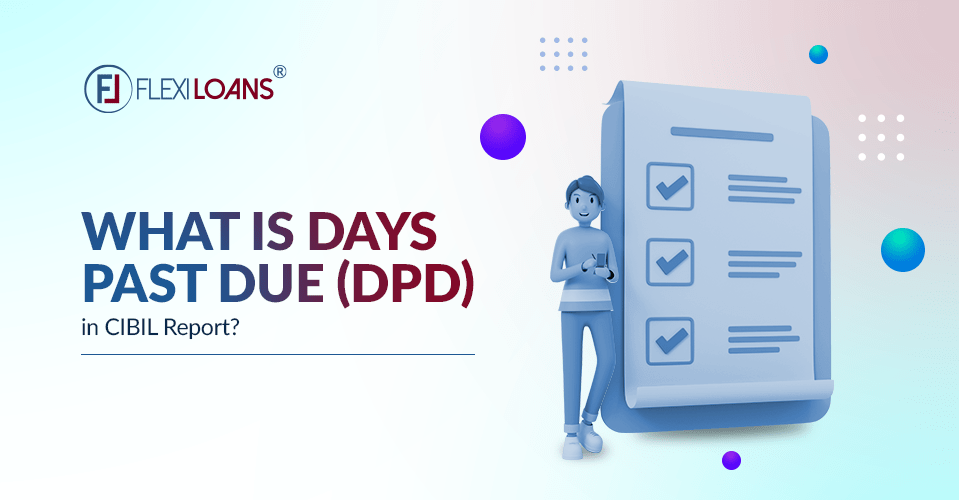Sep 06, 2022
Jul 25, 2025

Your credit report is a detailed account of your financial history, containing information about your credit accounts, late payments, bankruptcies, etc. These agencies collect data from creditors and use it to generate your credit report.
Your credit report is an essential tool that lenders use to determine your creditworthiness. Even landlords, employers, and insurers use it. You may also have come across the term DPD or Days Past Due when checking your CIBIL report, and it is a crucial factor that lenders look at when assessing your creditworthiness.
In this article, we will explain:
- What is the full form of DPD?
- What does DPD in finance means?
- What is the DPD full form in banking?
- How it affects your CIBIL score?
What is DPD in Banking and DPD full form in banking?
The full form of DPD in banking stands for Days Past Due. It is a metric used by lenders to assess an individual’s credit risk. DPD is the number of days that have elapsed since the due date of a particular credit account.
For instance, if you have a credit card with a monthly payment due date of the 5th every month and you make the payment on the 15th, your DPD would be 10.
DPD in banking is an essential factor that lenders consider when evaluating loan applications. A high DPD indicates that an individual is a risky borrower and is more likely to default on loan repayments. On the other hand, a low DPD suggests the individual is a responsible borrower and is less likely to default on loan repayments.
How does DPD affect your CIBIL score?
Your CIBIL score is a 3-digit number that ranges from 300 to 900. It is a numerical representation of your creditworthiness. A high CIBIL score indicates that you are a low-risk borrower and are more likely to repay your debts on time. On the other hand, a low CIBIL score indicates that you are a high-risk borrower and are more likely to default on your loan repayments.
The calculation of your CIBIL score uses several factors, including your credit history, repayment history, credit utilisation ratio, etc. One of the key factors that affect your CIBIL score is DPD.
If you have a high DPD, it will negatively impact your CIBIL score. It indicates that you are not a responsible borrower and are more likely to default on loan repayments.
On the other hand, if you have a low DPD, it will positively impact your CIBIL score. It signals that you are a responsible borrower and are less likely to default on loan repayments.
It is important to remember that your CIBIL score is not static – it can change over time based on your credit behaviour. If you have a high DPD, you can improve your CIBIL score by making timely payments and bringing down your DPD.
What is a good DPD?
A good DPD depends on the type of credit account. For a credit card, a DPD of less than 30 days is considered good. A home loan DPD means less than 90 days is considered good.
It is important to remember that your DPD means should not be too low or too high. If your DPD is too low, it may indicate that you are not using your credit limit, which can hurt your CIBIL score. On the other hand, if your DPD is too high, it will hurt your CIBIL score.
How to improve your DPD?
If you have a high DPD, you can improve your CIBIL score by following these steps:
1. Make timely payments:
This factor is the most important step to improving your DPD. Make sure you make all your loan repayment with 90 days of the due date. If you have difficulty remembering to make a payment after 90 days, you can set up reminders on your phone or calendar.
2. Bring down your credit utilisation ratio:
Another factor that affects your CIBIL score is your credit utilisation ratio. It is the percentage of your credit limit that you are using. For instance, if your credit limit is Rs. 1 lakh and you have used Rs. 50,000, your credit utilisation ratio would be 50%.
It is important to keep your credit utilisation ratio low – ideally, it should be below 30%. If your credit utilisation ratio is high, it will hurt your CIBIL score. You can reduce your credit utilisation ratio by either paying off your debts or increasing your credit limit.
3. Keep your credit accounts active:
It is important to keep them active even if you are not using them, and this is because lenders consider closed and inactive accounts when calculating your CIBIL score or DPD In Loan. If you have any inactive accounts, make sure you close them before they start impacting your CIBIL score or DPD Loan.
4. Check for errors in your credit report:
Sometimes, there may be errors in your credit report or your Day Past Due payments. These errors can impact your CIBIL score. If you spot any errors, dispute them with the credit bureau.
5. Maintain a good credit history:
One key factor that affects your CIBIL score and what your DPD In Cibil Means synonymous is credit history. Lenders assess your creditworthiness based on your past repayment behaviour, and good credit history will improve your chances of getting a loan at a lower interest rate.
You can build a good credit history by making all your loan repayments on time and maintaining a low credit utilisation ratio.
Following these steps will help you improve your DPD and, in turn, your CIBIL score. A high CIBIL score will make it easier for you to get loans and credit cards at favourable terms and rates in the future, along with a record of good STD in CIBIL.
FlexiLoans is a leading online provider of business loans in India. We offer quick, easy and paperless loans to MSME. We are committed to providing fast, convenient and transparent access to credit.
FlexiLoans offers a variety of loan products that can be customized to meet your specific needs. In addition, we have a vast network of financial partners, and our loan officers will work with you to find the best loan solution for your business.
With FlexiLoans, you can get a small business loan in as little as 24 hours. We offer competitive interest rates and flexible repayment terms. You can apply for a loan from anywhere in India by answering some questions online.
We are here to help you grow your business. Apply for business loan today!
Conclusion
DPD meaning in banking is an important factor that lenders consider when assessing an individual’s creditworthiness. A high DPD indicates that an individual is a risky borrower and is more likely to default on loan repayments.
On the other hand, a low DPD indicates that an individual is a responsible borrower and is less likely to default on loan repayments. You can improve your DPD by paying your bills on time and keeping your credit utilisation low, and this will show lenders that you’re a responsible borrower.







